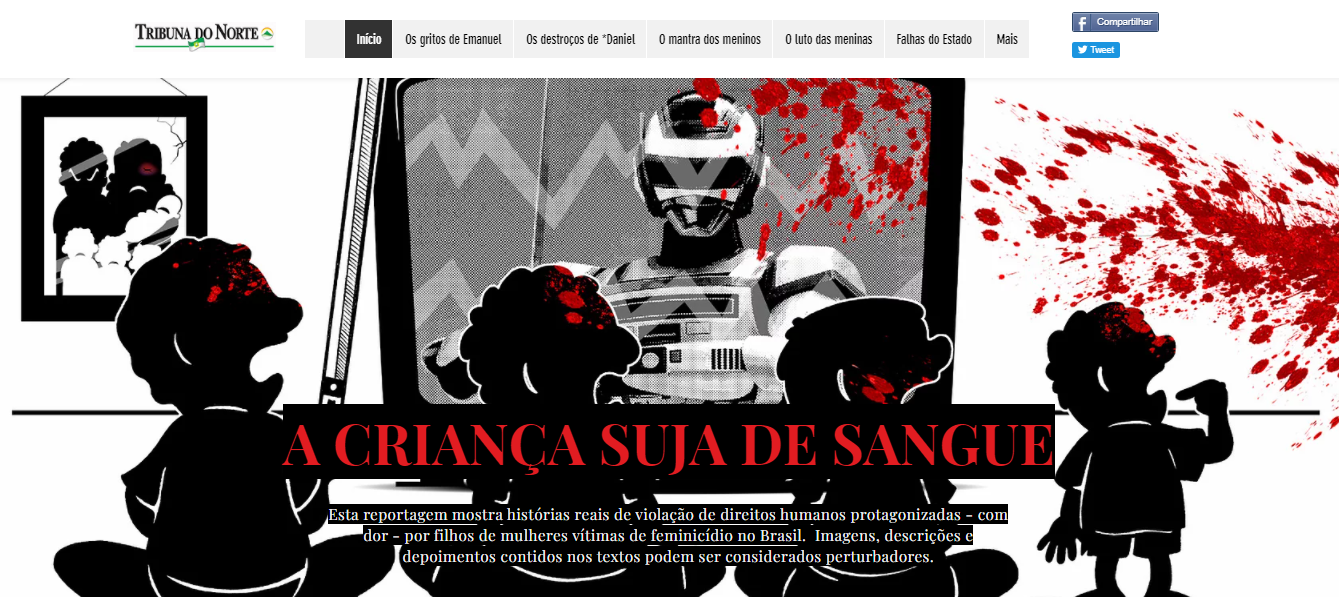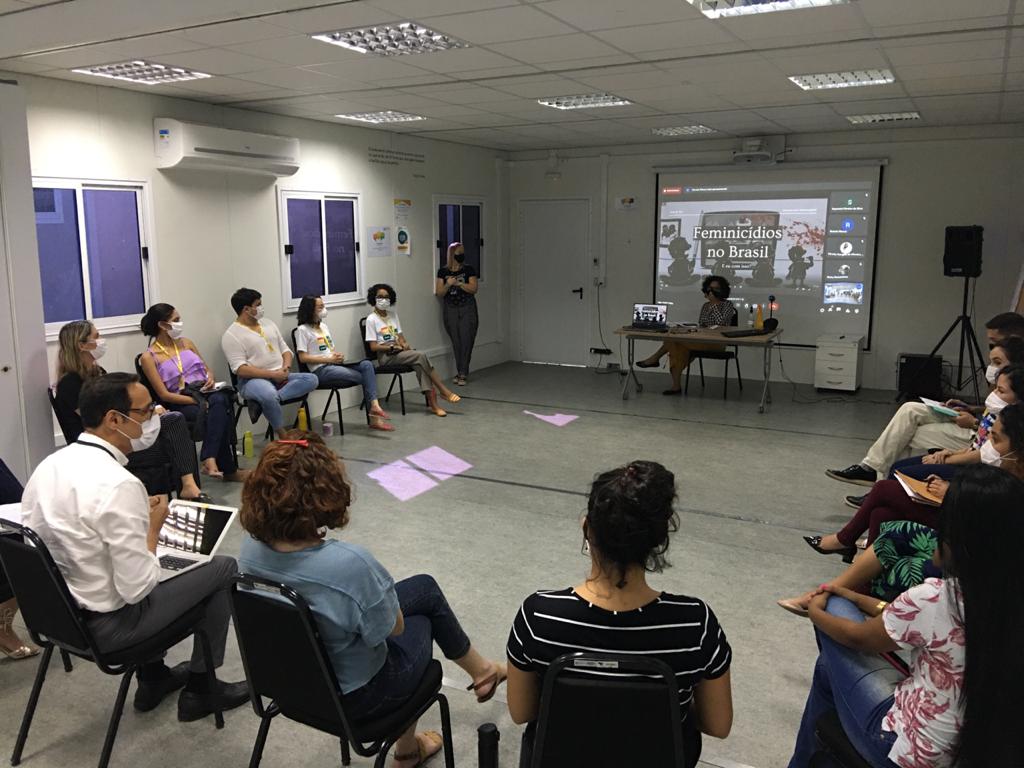
Kamila Tuenia
news reporter
What is the impact of a feminicide on the lives of the people who remain, especially the children of the victims? According to journalist and master in investigative journalism from Birkbeck University of London, England, Renata Moura, psychological, social and emotional damage drags on for decades for boys and girls, some of them witnesses of the crimes that victimized their mothers.
The subject was presented by the journalist to students of the discipline Education for Global Citizenship at the Santos Dumont Institute (ISD), headed by the professor-researcher and general director of the Institute, Reginaldo Freitas Júnior, and is offered in the graduate of Multiprofessional Residency in Health Care for Persons with Disabilities It's from Master's in Neuroengineering.
Renata investigated the impacts of feminicides on the victims' children as her master's thesis, the journalistic dissertation “We saw, we saw dad killing mom, and we were left here with nothing” (We saw, we saw my father kill my mother and we were left with nothing), approved this year and adapted in Portuguese, with unpublished excerpts, such as the report “The bloodstained child” (www.acriancasujadesangue.com.br) – published on a special hotsite in partnership with the newspaper Tribuna do Norte.

For two years, the journalist collected data via the Access to Information Law, analyzed more than 600 police reports, crossed with information from court documents, others obtained via questionnaires, and conducted interviews with specialists, children of victims of femicide and a woman who survived an attempted femicide, who tells how it affected her son, who was five years old at the time.
The work was initially inspired by a case from 2016, in Rio Grande do Norte, in which a 3-year-old boy witnessed his mother's feminicide and began to imitate the sound of the shots he heard on a daily basis.
According to Renata, state inaction fuels an endless cycle of violence. “There are no public policies in Brazil for those who remain. There are only isolated initiatives. The victims' children carry the consequences of the crime for years, often witnessed by them. In the forms of police reports, for example, there is not even a space to answer if the victim has children or not and who they are. The State does not know if they get sick, if they reproduce violence, if and how they are affected”, says the journalist, adding that there is a lack of information, psychological support and financial support for these families.
“There are many formal definitions of what femicide is. But for the children of these women, the great meaning of this crime is the death of the mother and the lack of support to move on”, she observed in the class called “Feminicides in Brazil: what about me with that?, held last Wednesday , on the 2nd of June.
"I dont care?"
The students of the course were provoked to reflect on the reality of feminicides in Brazil from the perspective that Renata brought about the children of these women, who die because of their gender, in cases involving domestic and family violence, contempt or discrimination against the target for being a woman, according to the definition of the Femicide Law.
Law 13.104/15 was created based on a recommendation by the CPMI (Mixed Parliamentary Commission of Inquiry) on Violence against Women of the National Congress, which investigated violence against women in Brazilian states between March 2012 and July 2013.
“Each one here within their area and within their life can answer that question, can they think about their 'and I with that?'. Mine was this job, something that bothered me as a reporter and was later taken to the university. I wanted people to know about this reality, I wanted to bring these people out of invisibility. In order for this – the reality of feminicides – to change, it is important that people know these stories”, reported Renata, during the class.
They are among the fruits of the “and I with that?” from the journalist the invitation of the National Council of the Public Ministry to the program on agenda, broadcast this week on YouTube by the Public Prosecutor's National Training Unit (UNCMP), where his work raised the discussion about the reality of victims and the ignored effects of these crimes on their children. Press play below to watch:
In addition, the dissertation was discussed in May by the entire service network for children and women victims of violence in Mato Grosso do Sul, at the invitation of the State Public Defender's Office, and used among the arguments of Judge Amini Haddad, from Mato Grosso, by presenting a project that provides training for judges to deal with cases of violence involving children.
Renata Moura is a master in Investigative Reporting (Investigative Journalism) from Birkbeck University of London, was a reporter for BBC News Brasil in London and has won 27 journalism awards. In addition, she is listed by the Portal dos Jornalistas among the most awarded journalists in the Northeast and Brazil. She held the position of ISD communication advisor for about a year, until the beginning of June 2021.
"I saw life coming out of my mother's eyes"

One of the stories told by the journalist in her master's work is that of Emanuel Santos, now a 25-year-old psychology student, who remembers: “I saw life coming out of my mother's eyes”.
On December 3, 2000, he saw his father kill his mother, Gerlândia, in Santana do Matos, a city in Rio Grande do Norte, 191 km from the capital, Natal. Emanuel was invited to the class and, in a videoconference, gave his report to the ISD students.
The student spoke about the consequences that the crime witnessed in childhood left in his life, including depression, suicide attempts and, until adolescence, aggressive behavior.
“At school I was called crazy, the nickname that hurt the most was 'Emanuel Loucura'. Because of what I saw, my reaction was always aggressive, I had fits of rage at school, I had depression and I tried twice on my own life, until I decided to look for a cure”, he said in the conversation with the students and also in an excerpt from the interview given to the journalist, shown in a video available online with original audio from the victims' children. Click here to access.
For Emanuel, two of the biggest difficulties in his story were, in addition to his mother's absence, comments from colleagues at school and the lack of adequate assistance. Asked about how 'ordinary people' can help children like him, he says that “what else can help a child who has a history of feminicide is love, caress, hug, smell, caress”.
Emanuel's experience of pain made him understand the importance of protecting women, so that they do not become victims, as well as their children. “When a mother dies, it's not just one death that happens, there are several daily deaths. Today I understand how important it is to take care of orphans, nobody looks at us, society judges and we spend our lives having to pick up our own pieces. It is important to take care of tomorrow so that other feminicides do not happen and, for that, we need to understand and reframe masculinity”, adds Emanuel.
Reframe masculinity
Have you ever heard the expression “machismo kills”? Ever wonder what's behind a woman's violent death? According to the final report of the Joint Parliamentary Commission of Inquiry on Violence against Women, which created the Feminicide Law, crime is the last instance of woman's control by man, the control of life and death. “It is expressed as an affirmation of possession”, says the document, pointing out that male possessive behavior, among many other reasons, leads women to suffer various types of violence to death.
Emanuel Santos says that he grew up with the impression that violence is normal, but that this cycle needs to be broken. “I grew up thinking that violence was normal, we grow up in a culture understanding that you need to be a 'macho goat' and that can kill. To change this reality, it is necessary to start in schools, provide children with a life where they can dream, educate boys and girls so that what happened to me, for example, does not happen again”, he reported.

During the class, the general director of ISD, Reginaldo Freitas Júnior, spoke about how important it is to reframe masculinity to break cycles of violence.
He also emphasized that dialogue with children, “welcoming, listening, but also explaining”, is essential to help them deal with the violence they have experienced.
“One cannot underestimate the child's ability to understand what is around him. The child can be two years old, three years old, four years old, he realizes what is happening. And not explaining is a way of violating rights. Explain, talk, respond as she asks, because all the children's channels of perception are open. So welcome, listen, but also explain”, he told the class, made up of psychology, social work, physiotherapy, speech therapy and biomedical engineering professionals.
Data
There is a lack of data, public policies and care for the children of women victims of femicide in Brazil, despite the upward curve of cases in the country. In the last five years, around 6,000 women and girls were registered in police reports in Brazil as victims of femicide. The total number of children who lost their mothers as a result of these cases is unknown, just as the number of women victims of femicide is underreported, points out the data search carried out by Renata.

A survey carried out by the Violence Observatory Network outlines recent data on the current reality and points out that at least five women were murdered or victims of violence per day in 2020.
The journalist also found that, in São Paulo alone, around 22% of those arrested for feminicide in a prison complex say they grew up in equally violent homes and that they saw their mothers being beaten or murdered. “Driven or not by other determinants of criminality, before reproducing barbarism against women, companions, daughters, sisters, and acquaintances when they became adults, some of them had already been arrested for theft, theft, drug trafficking, bodily harm, threat and Lei Maria da Penha, for example”, details Renata Moura in her work.
She noted during the class that the search for solutions to these stories also involves raising awareness about the role of people in society, about studies regarding the profile of these prisoners and about projects to rehabilitate them in a way that they understand that they should not attack or kill. , but to treat women and any other human being with respect and dignity.
KNOW MORE:
EDUCATION FOR GLOBAL CITIZENSHIP
ISD has offered the Education for Global Citizenship discipline since 2018 in the postgraduate programs in Neuroengineering and Multiprofessional Residency in Health Care for Persons with Disabilities. This semester, the discipline brings together 19 students from the Residence and Master's – including psychology, social work, speech therapy, physiotherapy, biomedicine and biomedical engineering professionals.
Sustainable Development Goals, feminicides, education for an anti-racist society, human rights, LGBTQIA+ movement, ableism, reducing inequalities and empowering women and girls in science are among the topics that will be addressed in the semester. The discipline has the assumption of thinking globally and acting locally.
“If I were to summarize what we intend to share over the semester, I would say that it is to think globally and act locally. This maxim is not mine. It's from the sociologist Ulrich Beck and it's this understanding that I belong to something bigger than what's around my navel, that I'm connected with that something bigger, that I have rights and duties towards that something bigger and that this has to do with the fact that I respect my humanity”, says the professor-researcher and general director of ISD.
Text: Kamila Tuenia / Ascom – ISD
Photos: Kamila Tuenia and Reproduction Google Meet
Communication Office
comunicacao@isd.org.br
(84) 99416-1880
Santos Dumont Institute (ISD)
It is a Social Organization linked to the Ministry of Education (MEC) and includes the Edmond and Lily Safra International Institute of Neurosciences and the Anita Garibaldi Health Education and Research Center, both in Macaíba. ISD's mission is to promote education for life, forming citizens through integrated teaching, research and extension actions, in addition to contributing to a fairer and more humane transformation of Brazilian social reality.















